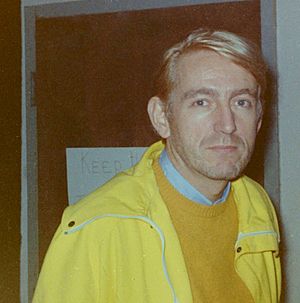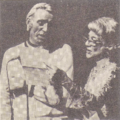Rod McKuen facts for kids
Quick facts for kids Rod McKuen |
|
|---|---|

McKuen in 1970
|
|
| Background information | |
| Birth name | Rodney Marvin Woolever |
| Born | April 29, 1933 Oakland, California, U.S. |
| Died | January 29, 2015 (aged 81) Beverly Hills, California, U.S. |
| Occupation(s) |
|
| Instruments |
|
| Years active | 1955–2004 |
| Associated acts | Jacques Brel |
Rodney Marvin McKuen (April 29, 1933 – January 29, 2015) was an American poet, singer, and songwriter. He became one of the most popular poets in the United States in the late 1960s.
McKuen created many types of recordings. These included popular songs, spoken poetry, film music, and classical music. He was nominated for two Academy Awards for his music. His translations of songs by Jacques Brel helped make the Belgian songwriter famous in English-speaking countries. McKuen's poems often talked about love, nature, and spirituality. His songs sold over 100 million copies worldwide. He also sold 60 million books of his poetry.
Contents
Early Life and Career Beginnings
Rodney Marvin Woolever was born on April 29, 1933, in Oakland, California. He had a difficult childhood and ran away from home. He worked many different jobs along the West Coast. He was a ranch hand, a railroad worker, and a radio disc jockey. He always sent money home to his mother.
Because he didn't finish school, McKuen started keeping a journal. This is where he wrote his first poems and song lyrics. After leaving Oakland Technical High School in 1951, he worked as a newspaper writer. He also wrote scripts during the Korean War.
McKuen moved to San Francisco. There, he read his poetry in clubs. He performed with famous "Beat poets" like Jack Kerouac. He also started singing folk songs at a club called The Purple Onion. Soon, he began to include his own songs in his shows. He signed with Decca Records and released several pop albums. McKuen also acted in movies like Rock, Pretty Baby (1956). He even sang with Lionel Hampton's band. In 1959, McKuen moved to New York City. He composed music for a TV show called The CBS Workshop.
Discovering Jacques Brel's Music
In the early 1960s, McKuen moved to France. There, he met the Belgian singer-songwriter Jacques Brel. McKuen began to translate Brel's songs into English. One of these was "If You Go Away", which became a worldwide hit. It was based on Brel's song "Ne me quitte pas".
McKuen also loosely translated Brel's song "Le Moribond" into "Seasons in the Sun". The British group The Fortunes had a hit with it in 1969. Later, in 1974, singer Terry Jacks made "Seasons in the Sun" a best-selling pop song. He also had a hit with "If You Go Away." McKuen translated songs by other French songwriters too.
Rod McKuen's Poetry
In the late 1960s, McKuen started publishing books of poetry. He became very popular with young people. Some of his famous collections include Stanyan Street & Other Sorrows (1966) and Listen to the Warm (1967). His album Lonesome Cities, which featured him reading his poems, won a Grammy Award in 1968.
McKuen's poems were translated into eleven languages. His books sold over 1 million copies in 1968 alone. He said his romantic poetry was inspired by American poet Walter Benton. Overall, McKuen sold more than 60 million books worldwide.
Songwriting Success
Rod McKuen wrote over 1,500 songs. He released about 200 albums. These albums sold over 100 million copies around the world. Many famous artists performed his songs. These included Barbra Streisand, Frank Sinatra, Johnny Cash, and Andy Williams.
In 1959, McKuen had a novelty song called "The Mummy." It reached No. 39 on the Billboard pop chart. In 1961, his song "Oliver Twist" reached No. 76. His singing voice often sounded rough. This was because he strained his vocal cords from too many performances.
McKuen worked with many composers, like Henry Mancini and John Williams. His orchestral music was performed by orchestras globally. He received two Academy Award nominations for his film music. These were for The Prime of Miss Jean Brodie (1969) and A Boy Named Charlie Brown (1969). He also sang the title song for A Boy Named Charlie Brown, which was the first animated movie based on the Peanuts comic strip.
In 1967, McKuen began working with arranger Anita Kerr. They created a series of albums where McKuen recited his poetry over Kerr's music. One of his best-known songs, "Love's Been Good to Me," was featured on an album he created for Frank Sinatra in 1969.
McKuen had his own TV special on NBC in 1969. He also hosted The Rod McKuen Show on BBC television in the UK in 1971. His song "Jean", sung by Oliver, reached No. 1 on the Billboard Adult Contemporary chart in 1969. Other popular songs he wrote included "The World I Used to Know" and "Soldiers Who Want to Be Heroes."
In 1971, McKuen became very popular in the Netherlands. His songs "Soldiers Who Want to Be Heroes" and "Without a Worry in the World" both reached number one there. He was voted the most popular entertainer in the Netherlands that year.
During the 1970s, McKuen started writing larger orchestral pieces. He also continued to publish poetry books. In 1977, he wrote Finding My Father. This book shared his search for information about his biological father. It helped make such information more available to adopted children. McKuen continued to perform concerts around the world. He often appeared at Carnegie Hall in New York.
Later Years and Legacy
In 1981, McKuen stopped performing live concerts. He faced health challenges for a decade but continued to write poetry. He also did voice-over work for animated shows. These included The Little Mermaid movie and its TV series.
In 2001, McKuen published A Safe Place to Land, a book of new poems. He also held annual birthday concerts at Carnegie Hall or the Lincoln Center for ten years. He was the Executive President of the American Guild of Variety Artists (AGVA) for a long time.
Rod McKuen lived in Beverly Hills, California. He passed away on January 29, 2015, due to pneumonia.
LGBT Activism
McKuen was involved in the LGBT rights movement. In the 1950s, he was an important member of the San Francisco chapter of the Mattachine Society. This was one of the first groups to support LGBT rights in the United States.
Criticism and Public Opinion
Even though Rod McKuen was very popular, critics and academics often did not take his work seriously. Some critics felt his poetry was too simple or overly sentimental. One writer said his books received "uniformly unkind reviews." McKuen himself once joked that "The most unforgivable sin in the world is to be a bestselling poet."
Some described his poetry as "sweet kitsch." Newsweek magazine called him "the King of Kitsch" in 1969. Writer Nora Ephron said his poems were "superficial and platitudinous and frequently silly." Pulitzer Prize-winning poet Karl Shapiro even said, "It is irrelevant to speak of McKuen as a poet. His poetry is not even trash."
Despite the criticism, a biography published in 2019, A Voice of the Warm: The Life of Rod McKuen, highlighted his importance in pop culture. Music historian Michael Feinstein wrote that McKuen knew how to create work that made people feel connected. He believed McKuen's work still speaks to important human feelings like romance and relationships.
Images for kids
See also
 In Spanish: Rod McKuen para niños
In Spanish: Rod McKuen para niños 
 | Sharif Bey |
 | Hale Woodruff |
 | Richmond Barthé |
 | Purvis Young |


